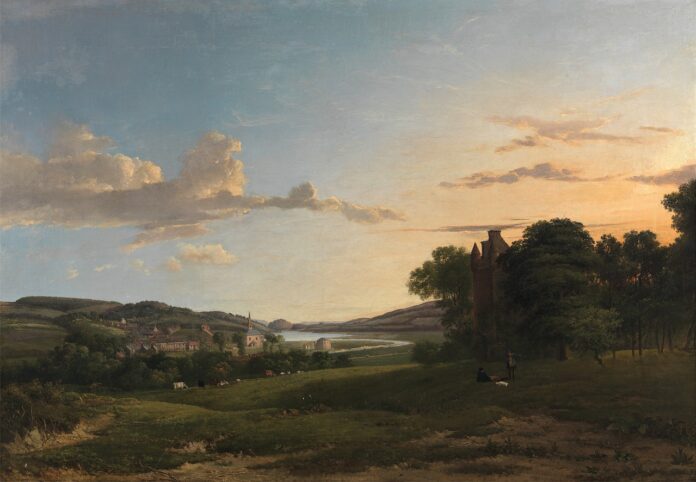Northanger Abbey by Jane Austen is a posthumous novel published in 1817 after the author’s death. It is a satirical version of a “classic” gothic novel, and the main character is Catherine Morland, who could be considered the Cinderella created by Jane Austen.
Catherine Morland – An Unconventional Heroine
Catherine Morland is an unconventional heroine of the novel Northanger Abbey by Jane Austen. She does not embrace all the traits of the typical protagonist of a conventional classic novel. Since infancy, Catherine showed no peculiar characteristics besides enjoying outdoor activities such as horseback riding, baseball, and cricket. Until age fifteen, Catherine does not enjoy reading books or indulging in finery. From age fifteen, Miss Morland’s character and look change. Indeed, she became a good-looking girl and started reading novels about heroines and Gothic fiction books. Catherine “began to curl her hair and long for balls”, becoming a pretty and refined girl. Catherine is a strong girl who shows her integrity and qualities mainly at the novel’s end. During the narration, once she arrives in Bath, she endures all the distresses because she makes acquaintances with deceitful persons such as Isabella and her brother John Thorpe.
An Unusual Gothic Novel
Northanger Abbey by Jane Austen is an unusual novel referencing the Gothic literary genre. The reader follows Catherine’s adventures as she enters the world of society, which is not a peaceful world. Catherine’s best friend, Isabella, reveals herself as a treacherous betrayer, representing the society where Catherine must learn to survive. The Thorpe family represents a real danger for Catherine and a source of distress. As soon as the novel’s heroine becomes more acquainted with the Tilneys, particularly Henry, she will discover that her ignorance and limited understanding are as attractive as her beauty and charm. The mystery is a constant element of the novel, especially since Catherine is invited as a guest to Northanger Abbey, the magnificent residence of the Tilney family in Gloucestershire. The enigmatic atmosphere of the place and the austere and severe authoritarianism of the general are Catherine’s primary sources of curiosity and investigation. In particular, after Henry describes his vision of her visit to the mansion, adding many references from gothic books, Catherine subconsciously remains impressed.
The Society in Northanger Abbey by Jane Austen
The society pictured in Northanger Abbey by Jane Austen is a type of theatre of wars. Catherine will learn at her expense how painful social life is in a society made of dishonest individuals and fortune hunters. The Thorpe family and General Tilney represent Catherine’s social enemies and adversaries even though; initially, they might appear friendly admirers and endearing supporters of the heroine. The merits and faults of Catherine are related to her family’s socioeconomic status. Material wealth and status are essential attributes for a person to be valued and appreciated in the society where Catherine starts her public life. The young lady is considered a potential prospect because of her alleged asset and is viewed as a commodity. Once General Tilney makes up his mind regarding Miss Morland, she is just a disgrace in his life, and he consequently gets rid of her brutally.
Northanger Abbey: A Not-So-Gothic Residence
Catherine’s expectation due to Henry Tilney’s description of fake gothic scenarios in his family residence in Northanger Abbey is one of the elements of parody of this unique novel. Ultimately, she will realise that she is the victim of her fantasies and presumptions due to the effect in her subconscious of the many Gothic novels she had read. Disappointment and delusion are the main ways Catherine Morland changes her point of view and advances in her adulthood. The modern modishness of the furniture and the restoration of part of the Abbey surprise and displease Catherine. The mansion has no ghosts, skeletons or lugubrious relics that Miss Morland was expecting.
Patriarchal Authority and Female Spaces
General Tilney represents the patriarchal authority and control over the female spaces and life. In Northanger Abbey by Jane Austen, he is an unheroic character and the ignominious and oafish John Thorpe. The General is ruthless and greedy and loves to exercise his authority and tyranny over others’ lives. Even on joyful occasions, his presence is a source of distress and tension for Catherine. She feels overwhelmed and deprived of relaxation during his stay in Northanger Abbey. Indeed, she enjoys her time in the ancient residence only in the presence of Eleanor and Henry Tilney.
Reading Novels in Northanger Abbey by Jane Austen
Since the beginning of Northanger Abbey, Jane Austen emphasises the importance and influence of reading. Gray, Pope, Shakespeare, and Thomson are among the authors she mentions. The fragments of poems and plays she cites concern stories of class conflicts, corruption, gender difference, love, and power. Reading is a fundamental way to approach reality and understand the connotations of a text. Even though reading is a tool for self-improvement, it can also act as an illusory lens to interpret the circumstances in the real world. The preference for the literary genre reflects the class, gender and culture level of the reader. It was typical for women to prefer reading novels, and in this case, Catherine is very fond of Gothic novels such as The Mysteries of Udolpho by Ann Radcliffe. She does not comprehend history books, finding them unintelligible.
Catherine Morland: An Unintellectual Heroine
Catherine is not the typical romantic heroine, and she is not even a bookworm. She is an unintellectual and illiterate girl trapped in the precarious and limited role of a feminine and submissive woman. Her traits of an ignorant and naive girl make her very attractive in the eyes of Henry Tilney. Catherine is not a feminist, and she accomplishes attracting his love making him feel intellectually and mentally superior because of his refined culture. She is firmly convinced that history is a male narrative unsuitable for her mind. Catherine reflected on her period when there was no woman’s history yet because politics and wars did not concern women directly.
Novels As Gynocentric Stories And History Texts As Books For Men
In Northanger Abbey, Jane Austen describes Catherine Morland as a girl fond of novels because they are gynocentric stories where she can identify herself with the main female characters. Most novels tell stories about women expressing their fears, dreams, passions, failures and achievements. At the novel’s end, Catherine is portrayed as a heroine who endures a petty, sad and solitary forced return to her family house in Fullerton in a hack post-chaise because she was guilty of being less wealthy than she was supposed to be. The Gothic chronologies influence Catherine’s mind so profoundly that during her stay in Northanger Abbey, she projects her distresses and insecurities in the fictitious Gothic world. Indeed, since her first night in the big mansion, Catherine tries to decrypt mysterious findings such as a massive heavy chest and an old-fashioned black cabinet. Her consequent uneasiness due to the General’s personality drives her to find a getaway in her Gothic imaginary and fictional world typical of the novels she reads.
The Women’s Intellectual And Social Submission In Northanger Abbey by Jane Austen
The intellectual superiority of Henry Tilney is represented by his peculiar literary tastes that included novels, history, and politics. He has academic authority because he is acquainted with male texts, such as history books and women’s books, such as novels. Catherine accepts his paternalistic vision recognising her cultural inferiority. This frame of mind is a consequence of that society’s state where men were happy with female ignorance. Miss Morland is not reluctant to accept her feminine and submissive role of an unrefined girl.
On the contrary, she is delighted and cheerful to submit to Henry’s cultural authority. Catherine attempts to use the only knowledge from her Gothic novels to interpret and try to understand the reality around her with the consequence of humiliating herself when interacting with Henry. How their readers own and interpret novels determines each individual’s perspective and view of the society they are acquainted with.
Some Introspection
In the end, one of the novel’s implications is that even though an event can appear unhappy, in the end, it reveals as a necessary portal to a better path and end. The General’s unfair interference came far to damage the connection between Catherine and Henry because they became more acquainted with each other with time, and their relationship improved as soon as their knowledge of each other was enhanced. Furthermore, Jane Austen gives the readers the freedom to give their interpretation with the final sentence: “I leave it to be settled by whomsoever it may concern, whether the tendency of this work be altogether to recommend parental tyranny, or reward filial disobedience.“





